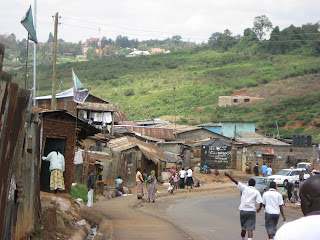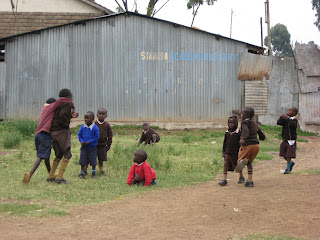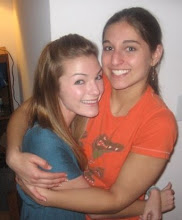
The past two days were very humbling, but for extremely different reasons. Yesterday we toured Kibera, the largest slum in Africa and the second largest in the world. I met Matteo, Jaye, Lauren, and our tour guide Peter at Junction and then we set off on foot along the railroad tracks. Kids were playing soccer both on the side of the tracks, and on top of the hill, which was our first stop to take a panoramic picture of the vastness of the area. Then we wove our way through the 2 foot wide corridors between the walls made of sticks packed with muddy clay, ducking clotheslines and low-hanging roofs while avoiding stepping in the mud holes or on the random chicken. The trash that manages to buildup in these cramped alley ways is unfathomable. When we finally reached the main road, we stopped at the Ushikra Clinic and Maternity which provides some services to the population so they don't have to travel all the way to Kenyatta National Hospital and wait half a day to be seen.
 I took pictures of the fee sheets written in pen and taped on the walls, as well as their small incinerator for disposing of used sharps. Apparently, on a woman's first pre-natal visit here, she starts a payment plan so she can pay the delivery fee (a couple hundred shillings) by the time of the birth. They also have a small wing with a lecture hall and a few beds that was built by a charity organization, and a water tank where they sell clean water to the community. After we left, we also visited a children's home/orphanage that houses 80 children and teaches over 300. They are moving to a self-sustaining plot of land in Ngong, but it was fascinating to here how one woman's will and the help of some volunteers had built the two-story structure that provides food and shelter to so many kids.
I took pictures of the fee sheets written in pen and taped on the walls, as well as their small incinerator for disposing of used sharps. Apparently, on a woman's first pre-natal visit here, she starts a payment plan so she can pay the delivery fee (a couple hundred shillings) by the time of the birth. They also have a small wing with a lecture hall and a few beds that was built by a charity organization, and a water tank where they sell clean water to the community. After we left, we also visited a children's home/orphanage that houses 80 children and teaches over 300. They are moving to a self-sustaining plot of land in Ngong, but it was fascinating to here how one woman's will and the help of some volunteers had built the two-story structure that provides food and shelter to so many kids.  Another stop was a youth program that uses in-line skating to keep kids from being idle and turning to drugs and risky sexual practices. They are hoping to have a skate park built in the future, because the rough roads make them have to replace the wheels very fast and they can only afford to put 2 of the 4 wheels on each skate. We also saw a women's center where the make beautiful woolen rugs, scarves, and purses to sell to support themselves and other community efforts. Jaye bought some raw wool to make friendship bracelets at the school where she's teaching and Lauren bought a beautiful blue scarf. Our final stop was Peter's house, where we learned that he had helped film the Constant Gardener and other subsequent documentaries of the people of Kibera due to his native knowledge of the area. He was even featured in a 2005 issue of National Geographic which he showed to us proudly, and we signed a guestbook that he keeps that had over 300 signatures already.
Another stop was a youth program that uses in-line skating to keep kids from being idle and turning to drugs and risky sexual practices. They are hoping to have a skate park built in the future, because the rough roads make them have to replace the wheels very fast and they can only afford to put 2 of the 4 wheels on each skate. We also saw a women's center where the make beautiful woolen rugs, scarves, and purses to sell to support themselves and other community efforts. Jaye bought some raw wool to make friendship bracelets at the school where she's teaching and Lauren bought a beautiful blue scarf. Our final stop was Peter's house, where we learned that he had helped film the Constant Gardener and other subsequent documentaries of the people of Kibera due to his native knowledge of the area. He was even featured in a 2005 issue of National Geographic which he showed to us proudly, and we signed a guestbook that he keeps that had over 300 signatures already.  We were going to eat lunch at a local restaurant, but the other 3 had to get their stuff from Charity's and be in Ngong by four, so we caught a bus and then Peter helped me get on the right matatu back to Lenana. I'll be seeing Jay and Lauren again on Friday for our safari to Masai Mara. Overall, it was crazy to see the extreme poverty that some live in, and yet most our content with their lives and feel blessed with what they have. There were even more than a few TV antennaes poking up from the rusting tin roofs, and I suppose some people enjoy living where they are even if they could afford something a bit larger. It is amazing how much we take for granted.
We were going to eat lunch at a local restaurant, but the other 3 had to get their stuff from Charity's and be in Ngong by four, so we caught a bus and then Peter helped me get on the right matatu back to Lenana. I'll be seeing Jay and Lauren again on Friday for our safari to Masai Mara. Overall, it was crazy to see the extreme poverty that some live in, and yet most our content with their lives and feel blessed with what they have. There were even more than a few TV antennaes poking up from the rusting tin roofs, and I suppose some people enjoy living where they are even if they could afford something a bit larger. It is amazing how much we take for granted.
Dinner at Margaret's was amazing last night: beef stew, cabbage, and chapatti. I watched Kung Fu Panda with Patrick and finished one of the books I had brought with me and went to bed at a respectable 9pm.
 This morning I woke up for my first day of teaching at the Glad Kids Centre where Elsie first started with 3 kids in 2005 I believe. Today there were around 40, and I got to spend some time with all of them. My first class was the 8 oldest kids (ages 10-13), and I tried to get a feel for what they new about HIV/AIDS and general personal health. We talked about eating healthy, and we went off onto naming body parts in English and somehow even geometry. I'm not sure how much they understood, but I took up all the time until the morning porridge break.
This morning I woke up for my first day of teaching at the Glad Kids Centre where Elsie first started with 3 kids in 2005 I believe. Today there were around 40, and I got to spend some time with all of them. My first class was the 8 oldest kids (ages 10-13), and I tried to get a feel for what they new about HIV/AIDS and general personal health. We talked about eating healthy, and we went off onto naming body parts in English and somehow even geometry. I'm not sure how much they understood, but I took up all the time until the morning porridge break.  The feeding of the kids is a campaign Elsie started because a good number of the kids have no food or homes to go to during lunch break and can't be expected to learn on an empty stomach. I tried the porridge (flour, water, and a bit of lemon juice) and took some pictures of the kids playing around. Elsie also had me take pictures of 29 of the most needy kids to try and find sponsors for them via the website I am to make when I get back. She also wrote down their ages and a brief family history for me to put with the pictures. After the break, I taught the next youngest group (ages 6-9). We also talked about clean food and water and why is was important to wash our hands. Then we went into basic multiplication and some plant biology. Again, I'm not sure how much actually got through, but for the most part they didn't ignore me. Then was a lunch break of rice and peas for the teachers and the 15-17 students who could bay 20Ksh or ($0.23) a day to eat. The others are sent home or just wander around until classes start again around 2pm. For the last hour, I was with the youngest kids (ages 3-5) and pretty much useless.
The feeding of the kids is a campaign Elsie started because a good number of the kids have no food or homes to go to during lunch break and can't be expected to learn on an empty stomach. I tried the porridge (flour, water, and a bit of lemon juice) and took some pictures of the kids playing around. Elsie also had me take pictures of 29 of the most needy kids to try and find sponsors for them via the website I am to make when I get back. She also wrote down their ages and a brief family history for me to put with the pictures. After the break, I taught the next youngest group (ages 6-9). We also talked about clean food and water and why is was important to wash our hands. Then we went into basic multiplication and some plant biology. Again, I'm not sure how much actually got through, but for the most part they didn't ignore me. Then was a lunch break of rice and peas for the teachers and the 15-17 students who could bay 20Ksh or ($0.23) a day to eat. The others are sent home or just wander around until classes start again around 2pm. For the last hour, I was with the youngest kids (ages 3-5) and pretty much useless.  I started to use the phonics and addition flashcards that I'd brought with me, but one of the teachers had to help me be effective as the children are learning sounds and not actual letters. The diversity of the kids (some can only barely count) didn't make it easier and my limited Kiswahili wasn't enough to save me. Finally, they were let outside for P.E. and I just kept asking who knew a song to sing or a game to play. I tried teaching them "No More Monkeys Jumping on the Bed" and finally Elsie came and helped me stop them from trying to jump on me and pushing each other long enough for use to play some Duck, Duck, Goose. I think that went over all right except for the one girl who fell and started crying. I don't know if I would call my efforts a success, but I have gained so much respect for teachers, especially those who deal with the young ones who lack attention spans. Next week they said they will give me a science or English topic to plan a lesson around so I'm not just standing up there talking mostly nonsense. They are good kids though, and I plan on going to Nakumatt sometime this weekend and getting them a real soccer ball to play with during recess.
I started to use the phonics and addition flashcards that I'd brought with me, but one of the teachers had to help me be effective as the children are learning sounds and not actual letters. The diversity of the kids (some can only barely count) didn't make it easier and my limited Kiswahili wasn't enough to save me. Finally, they were let outside for P.E. and I just kept asking who knew a song to sing or a game to play. I tried teaching them "No More Monkeys Jumping on the Bed" and finally Elsie came and helped me stop them from trying to jump on me and pushing each other long enough for use to play some Duck, Duck, Goose. I think that went over all right except for the one girl who fell and started crying. I don't know if I would call my efforts a success, but I have gained so much respect for teachers, especially those who deal with the young ones who lack attention spans. Next week they said they will give me a science or English topic to plan a lesson around so I'm not just standing up there talking mostly nonsense. They are good kids though, and I plan on going to Nakumatt sometime this weekend and getting them a real soccer ball to play with during recess.  Elsie said the government does not contribute any funds at all to these community schools who take kids that the overcrowded government schools would forget about. In fact, the school has to pay fees to register to gove the kids end of term exams. Plans for the school (and the community youth group that meets on Saturdays) include drilling a well to sell clean water to the community, expanding the school so that grades do not have to be combined in on room, and being able to pay the teachers consistantly. Love you all, and I will see you guys in less than a month!
Elsie said the government does not contribute any funds at all to these community schools who take kids that the overcrowded government schools would forget about. In fact, the school has to pay fees to register to gove the kids end of term exams. Plans for the school (and the community youth group that meets on Saturdays) include drilling a well to sell clean water to the community, expanding the school so that grades do not have to be combined in on room, and being able to pay the teachers consistantly. Love you all, and I will see you guys in less than a month!


No comments:
Post a Comment